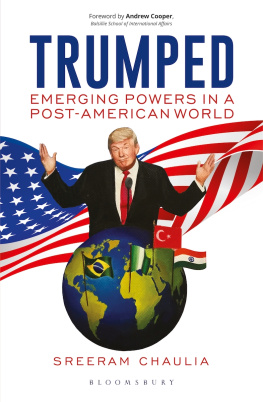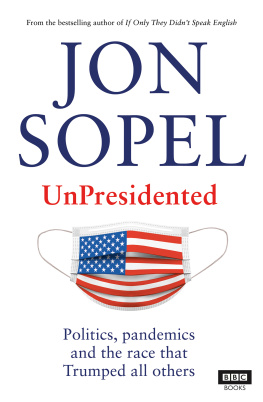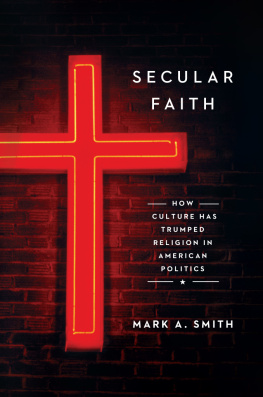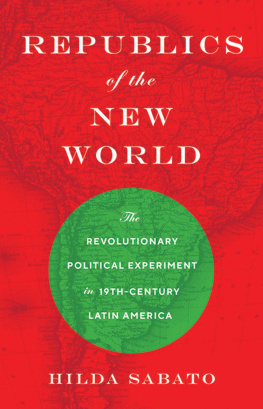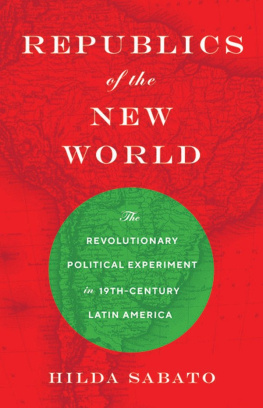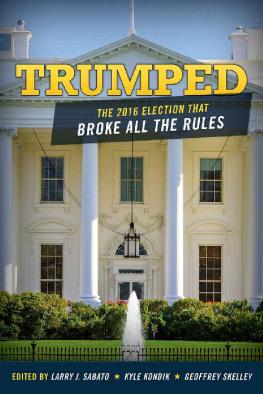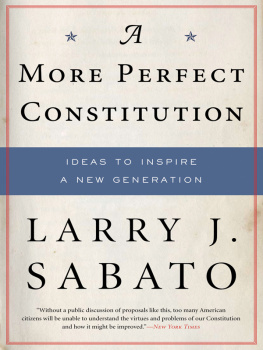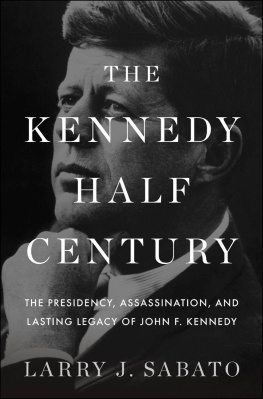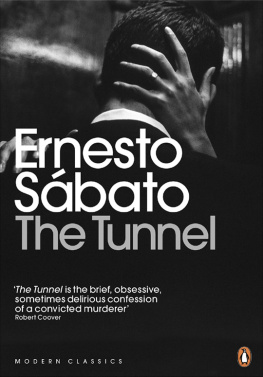Sabato - Trumped
Here you can read online Sabato - Trumped full text of the book (entire story) in english for free. Download pdf and epub, get meaning, cover and reviews about this ebook. publisher: Rowman & Littlefield Publishing Group, Inc., genre: Politics. Description of the work, (preface) as well as reviews are available. Best literature library LitArk.com created for fans of good reading and offers a wide selection of genres:
Romance novel
Science fiction
Adventure
Detective
Science
History
Home and family
Prose
Art
Politics
Computer
Non-fiction
Religion
Business
Children
Humor
Choose a favorite category and find really read worthwhile books. Enjoy immersion in the world of imagination, feel the emotions of the characters or learn something new for yourself, make an fascinating discovery.

Trumped: summary, description and annotation
We offer to read an annotation, description, summary or preface (depends on what the author of the book "Trumped" wrote himself). If you haven't found the necessary information about the book — write in the comments, we will try to find it.
Trumped — read online for free the complete book (whole text) full work
Below is the text of the book, divided by pages. System saving the place of the last page read, allows you to conveniently read the book "Trumped" online for free, without having to search again every time where you left off. Put a bookmark, and you can go to the page where you finished reading at any time.
Font size:
Interval:
Bookmark:
Alan I. Abramowitz is the Alben W. Barkley Professor of Political Science at Emory University and a senior columnist for Sabatos Crystal Ball. His most recent book is The Polarized Public: Why American Government Is So Dysfunctional.
Matt A. Barreto is cofounder and managing partner of the polling and research firm Latino Decisions. He has a Ph.D. in Political Science from the University of California, Irvine, and is currently Professor of Political Science and Chicana/o Studies at UCLA.
David Byler is an elections analyst for RealClearPolitics. David joined RealClearPolitics after graduating from Princeton University with a degree in Operations Research and Financial Engineering.
Anthony A. Cilluffo received his bachelors degrees in economics and political science from the University of South Florida after spending his junior year at the London School of Economics and Political Science. He is currently a research assistant at the Pew Research Center.
Rhodes Cook was a political reporter for Congressional Quarterly for more than two decades and is a senior columnist at Sabatos Crystal Ball.
Robert Costa is a national political reporter for the Washington Post and a political analyst for NBC News and MSNBC. He covers President Donald J. Trump and Congress, and frequently appears on Meet the Press, Morning Joe, and PBSs Charlie Rose.
Ariel Edwards-Levy is the polling director and a staff reporter for the The Huffington Post, where she covers politics and public opinion and cowrites the HuffPost Pollster newsletter. Previously, she worked as an associate polling editor during the 2012 and 2014 elections.
Natalie Jackson is Senior Polling Editor at The Huffington Post. She has a doctorate in political science from the University of Oklahoma, with heavy emphasis on statistics, survey methodology, and American politics.
Kyle Kondik is managing editor of Sabatos Crystal Ball, the University of Virginia Center for Politics nonpartisan newsletter on American campaigns and elections. He is the author of The Bellwether: Why Ohio Picks the President (2016).
Susan A. MacManus is the Distinguished University Professor in the Department of Government & International Affairs at the University of South Florida, Tampa Campus. She has been a longtime political analyst for a number of Florida media outlets, including in 2016 for the Tampa Bay ABC affiliate, ABC Action News, and sayfiereview.com (a well-known Florida political news aggregation site).
Diana Owen is Associate Professor of Political Science at Georgetown University and teaches in the Communication, Culture, and Technology graduate program, and has served as Director of the American Studies Program. She is the author of Media Messages in American Presidential Elections, New Media and American Politics (with Richard Davis), and American Government and Politics in the Information Age (with David Paletz and Timothy Cook).
Ronald B. Rapoport is the John Marshall professor of government at the College of William and Mary.
Larry J. Sabato is the Robert Kent Gooch Professor of Politics at the University of Virginia and director of its Center for Politics. He is the author or editor of more than twenty books on American politics and elections.
Greg Sargent is the author of The Plum Line, a blog of reported opinion from a liberal perspective, for the Washington Post.
Thomas F. Schaller is political director at Latino Decisions. He has a Ph.D. in Political Science from the University of North Carolina and is currently professor and chair of the Political Science Department at the University of Maryland, Baltimore County.
Gary M. Segura is co-founder and senior partner of the polling and research firm Latino Decisions. He has a Ph.D. in Political Science from the University of Illinois and is currently Dean of the Luskin School of Public Affairs at UCLA.
Geoffrey Skelley is associate editor of Sabatos Crystal Ball, the University of Virginia Center for Politics nonpartisan newsletter on American campaigns and elections.
Walter J. Stone is a professor of political science at the University of California, Davis. Rapoport and Walter Stone are the authors of Threes a Crowd: The Dynamic of Third Parties, Ross Perot, and Republican Resurgence.
Michael E. Toner is former chairman of the Federal Election Commission (FEC) and is cochair of the Election Law and Government Ethics Practice Group at Wiley Rein LLP in Washington, DC.
Karen E. Trainer served in the FECs Reports Analysis Division and is a senior reporting specialist at Wiley Rein LLP.
Sean Trende is the Senior Elections Analyst for RealClearPolitics. He is the author of The Lost Majority: Why the Future of Government Is Up for Grabs and Who Will Take It, and he coauthored the Almanac of American Politics 2014.
Janie Velencia is the Associate Polling Editor at The Huffington Post, coordinating the poll aggregation on HuffPost Pollster. Shes also written on the 2016 election, public opinion, and the state of the polling industry. She is a graduate of the University of Michigan.
Larry J. Sabato
A ll of us living in the twenty-first century now know how people felt in 1948, when the Chicago Tribune headline DEWEY DEFEATS TRUMAN was prematurely published, and the pundits and pre-election polls were dead wrong.
Yet 2016 was even worse than 1948. Instead of just a couple of prominent pollsters on the scene when President Harry Truman upset the heavily favored Republican Thomas E. Dewey, there were dozens of independent pollsters and hundreds of surveys taken nationally and in the battleground states. Some national surveys in 2016 did reasonably well, though many surveysespecially in the highly competitive statesdid not. Rather than halting the polling weeks before the 1948 election (believing the result was a done deal), the 2016 pollsters continued measuring public opinion right up to election eve, which should have made surveys more accurate, but did not in many cases.
Comparing Donald Trumps upset to Harry Trumans is not to equate the two, of course. Truman was the incumbent while Trump defeated the incumbent White House party. Truman had had a long career in politics and government, while Trump had never served a day in any public office. Truman won the popular vote by 4.5 percentage points; Trump lost it by 2.1 points However, their electoral vote totals were similarTruman at 303 and Trump at 304.
Their campaigning styles were also akin to one another. Truman loved to give em hell, and Trumps incendiary (and often inaccurate or outright false) charges were a new form of hell, augmented by his frequent use of Twitter to incite his millions of followers. Additionally, both Truman and Trump were underdogs, a status that confers a kind of freedom to roll the dice, and their unpolished speaking styles and populist approach attracted the white working class disproportionately.
Their opponents were of a sort, too. Dewey and Hillary Clinton made the classic mistake of frontrunners, sitting on their leads and saying little of consequence. The little man on the wedding cake, as Dewey was called, trafficked in platitudes and mainly attacked Truman. Reporters at the time noted the size and enthusiasm of Trumans crowds, a contrast with the desultory Dewey followers who appeared to be carrying out an obligation rather than joining a cause. Trumps crowds were normally huge and boisterous, full-throatedly chanting Lock Her Up (referring to Clinton, of courseurged on by Trumps declarations that she ought to be in prison). The secondary target at Trump rallies were members of the working press, who were often attacked individually and collectively by Trump and then threatened personally by the candidates most ardent backers.
Font size:
Interval:
Bookmark:
Similar books «Trumped»
Look at similar books to Trumped. We have selected literature similar in name and meaning in the hope of providing readers with more options to find new, interesting, not yet read works.
Discussion, reviews of the book Trumped and just readers' own opinions. Leave your comments, write what you think about the work, its meaning or the main characters. Specify what exactly you liked and what you didn't like, and why you think so.

